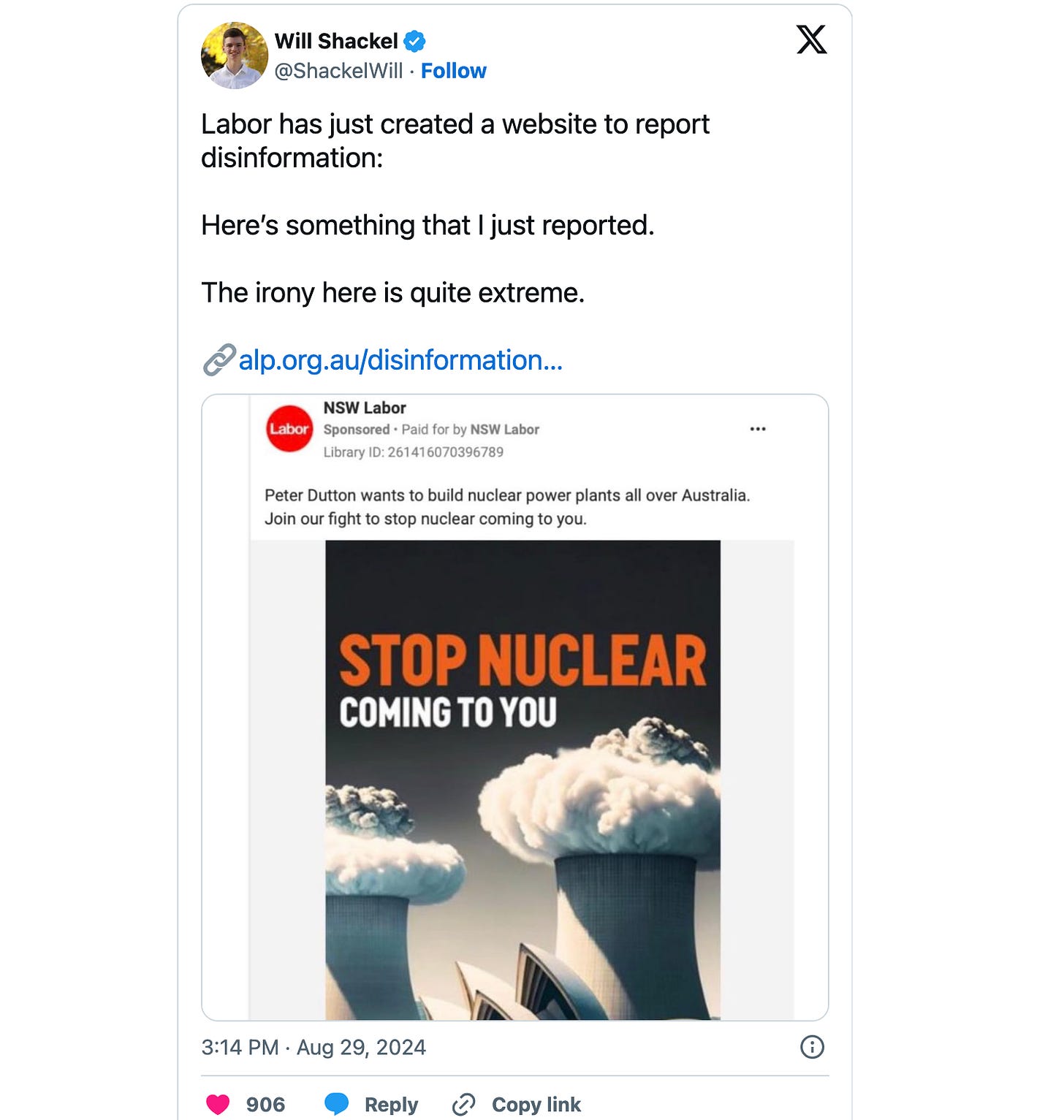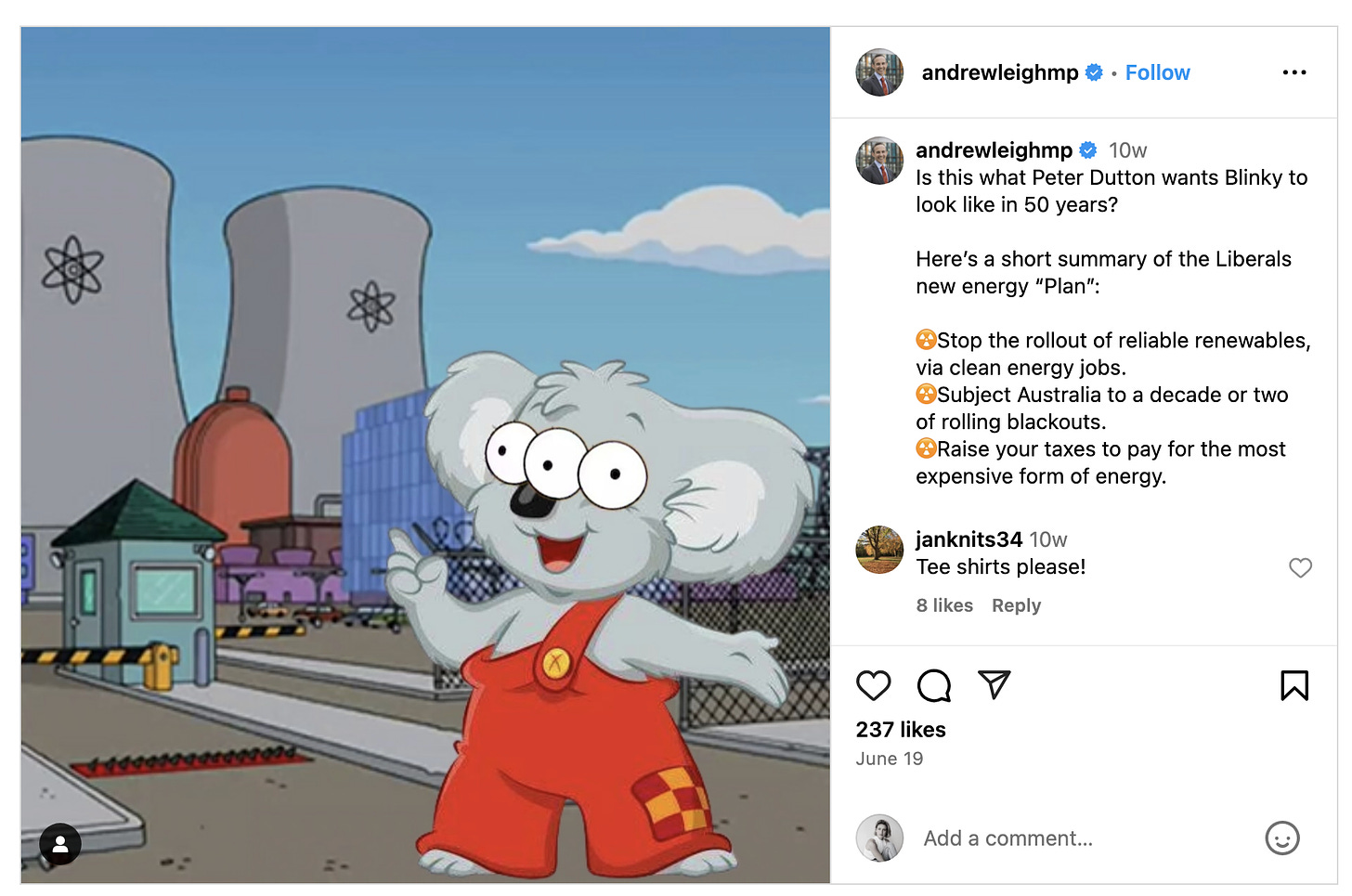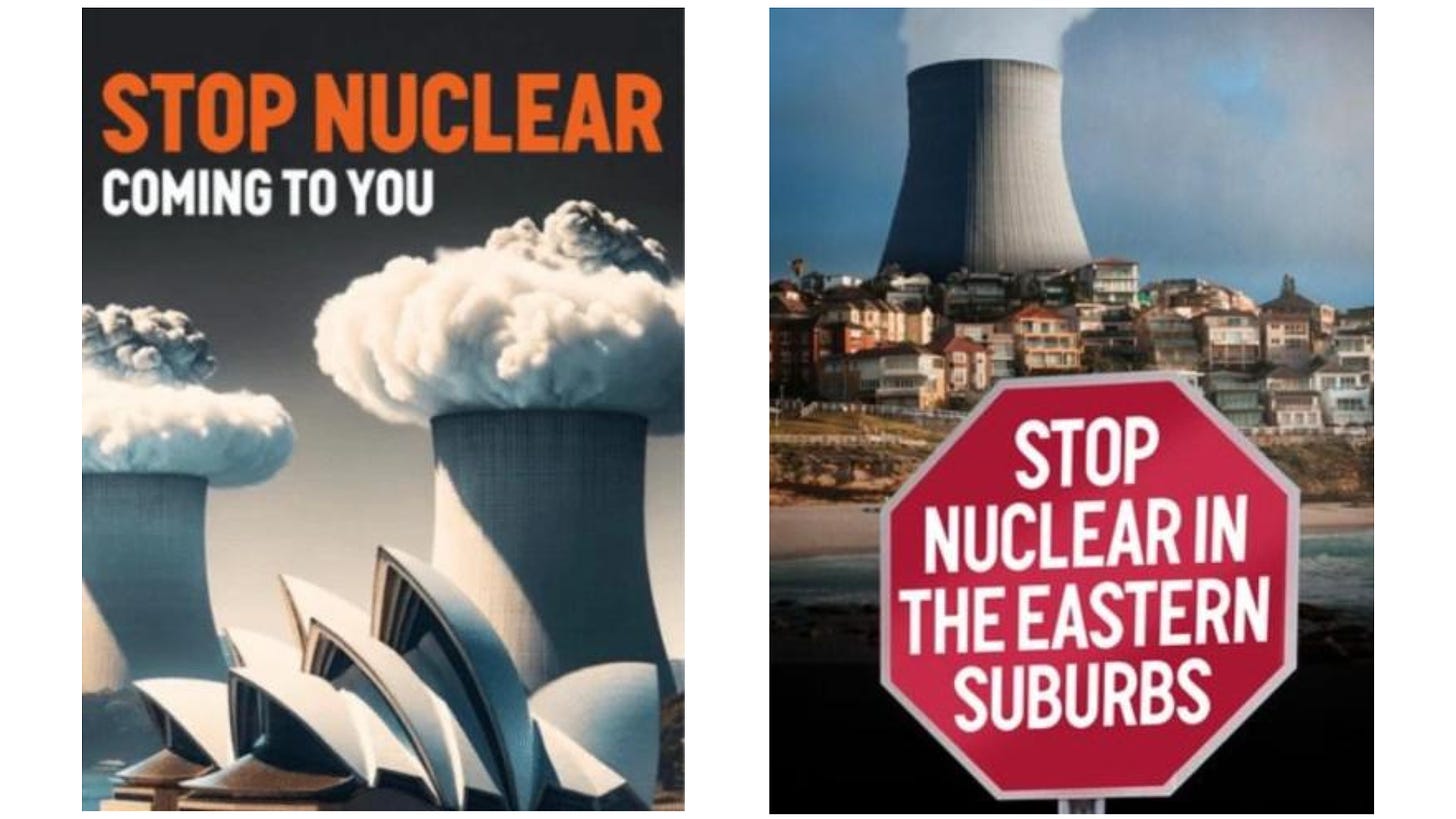A disinformation reporting portal initiated by the Australian Labour Party (ALP) to “fight lies and fake news” has reportedly been “swamped” with submissions of misleading Labour Party advertising.
“Election campaigns around the world and here in Australia have seen a rise in misinformation and disinformation campaigns, often from unknown or falsified sources, that scare and mislead people,” states the disinformation reporting webpage.
“It’s important that the Party is across sources of disinformation so we can respond swiftly,” it states, so that “Labour members and supporters can report disinformation they come across, especially online.”
The portal includes a form where people can report what disinformation they’ve seen, which social media platform they saw it on, and upload evidence.
Labour’s plan to combat disinformation with a new reporting register has spectacularly backfired after people started submitting the party’s own advertisements to be fact-checked. …
Young nuclear campaigner Will Shackel revealed to his social media followers on Thursday he had reported one of Labour’s own ads to the register.

“Labour has just created a website to report disinformation. Here’s something that I just reported. The irony here is quite extreme,” Shackel wrote on X, with a screenshot of a Labour Party anti-nuclear ad.
Earlier this year, opposition leader Peter Dutton (Liberal, Australia’s main centre-Right party) made nuclear energy a core part of the Liberal Party’s clean energy plan ahead of the federal election next year, announcing a plan to build seven nuclear power stations in June.
Labour responded with negative social media ads, including those below showing towering nuclear power plants in landmark, built-up Sydney locations.
“The Sydney Opera House can be seen in the foreground being towered over by two cooling towers with what appears to be mushroom clouds exploding from them.
“Peter Dutton wants to build nuclear power plants all over Australia. Join our fight to stop nuclear coming to you,” the slogan read.
“Cooling towers are used at some nuclear power stations as a way of ejecting heat from the plant and keep the equipment cool.
“However, the white vapour seen wafting off the towers is water vapour, not smoke or mushroom clouds commonly associated with a nuclear explosion.
“Another disputed element of the ad is the claim about where the Opposition is proposing nuclear plants be built, with Mr. Dutton suggesting just seven sites for development as part of his plan announced in July.
“None of these include the Sydney Opera House or general Sydney area.”
Sky News clarified that Labour’s anti-nuclear ads ran in April, before Dutton announced the Liberal Party’s proposed locations in June. Nevertheless, it is ludicrously misleading to picture a nuclear power plant adjacent to the Sydney Opera House and Sydney’s prestigious beach-front eastern suburbs.
Judging by the comments under Shackel’s post on X, others have been inspired to make their own reports of Labour advertising to the ALP’s disinformation portal.
Labour politicians have previously been criticised for “juvenile” three-eyed fish and Blinky Bill memes critical of the opposition’s nuclear power policy, but Prime Minister Anthony Albanese (Labour) said critics needed to “lighten up”.

Indeed, it would be ridiculous to report satire to a disinformation portal, although that’s essentially what Meta founder and CEO Mark Zuckerberg alleges the Biden Administration did, stating in a letter to U.S. Congress that the administration “pressured our teams for months to censor certain COVID-19 content, including humour and satire”.
The Australian Government also policed Covid memes on the internet, the Twitter Files show.
These scenarios highlight the political nature of these kinds of disinformation initiatives.
After all, what does Labour mean when it says the party intends to “respond swiftly” to disinformation reported on the portal?
I have contacted the ALP to request comment on what the party intends to do with the information collected on the disinformation reporting portal, and will update this post if a response is received.
Meanwhile, we can speculate. A politically savvy party focused on winning an upcoming election might use the information uploaded for some or all of the following purposes:
- Crowd sourcing a list of social media posts to report to platforms as being in contravention with their Community Guidelines, with a view to getting them taken down. Similar to what the Department of Home Affairs and Department of Health did during Covid.
- Informing sentiment research to shape messaging.
- Generating statistics to feed to friendly media and to use in campaign materials.
- Identifying influential actors who undermine party messaging, so as to target those actors specifically.
Even if a portal like this was created with the genuine motive of combating disinformation, perceptions of mis- and disinformation are inherently subjective, and therefore prone to partisan biases.
(I am talking exclusively here about attempts to police political expression, which obviously excludes illegal speech and content like defamation, incitement to violence or child pornography.)
Recent research from the News and Media Research Centre (NMRC) in Australia found that political orientation is associated with which topics people report seeing misinformation on.
Left-wing news consumers were more likely to report having seen misinformation about national politics, immigration and the Palestine and Israel conflict, while Right-wing news consumers were more likely to report having seen misinformation on climate change and the cost-of-living crisis.
In other words, what you think is mis- or disinformation depends on your politics.
In another 2022 study from the NMRC on Covid misinformation, the researchers reported that focus group participants did “not have a shared perspective or viewpoint about what misinformation is”.
What this suggests is that politically-driven attempts to fight mis- and disinformation through mass reporting operations are not capable of steering public discourse closer to the truth. Rather, they are political tools to achieve political ends. They should be treated as such, and trolled relentlessly.
This article was originally published on Dystopian Down Under, Rebekah Barnett’s Substack newsletter. You can subscribe here.













To join in with the discussion please make a donation to The Daily Sceptic.
Profanity and abuse will be removed and may lead to a permanent ban.
Richard Tice has always said the only way we could change the situation is to bring in an independent company and staff to manage the boat people.
I would go back to the old bounty system and pay per migrant returned.
Shame there’s no English subtitles but this clip has gone viral. Apparently this woman who lives in Israel celebrated the Hamas attack on Oct 7th on social media and now she’s being sent back to Gaza. Can you imagine how awesome it would be if European leaders would send everyone who has demonstrated hate and disrespect for our countries and culture back to where they came from? Many of our problems would be solved immediately.
https://twitter.com/benonwine/status/1724769299099722116
Thanks M. Not so funny when you get caught out. Would love to know if she is on benefits & cheap State rent.
That would be a start, but how many people born in this country hate the UK?
If these people don’t have dual nationality where can they be sent.
If other countries won’t accept people we don’t want here then what? This is the reason why we can’t put illegal immigrants who’ve crossed the channel on a boat straight back to France, quite sensibly the French were only too glad to see the back of them and won’t take them back.
If you were born here and provably despise or hate this country, and are siding with enemies, then you too should be ejected. We need some harsh policy and harsh direct action here.
“Where can they be sent”? ———–Back to France. The same problem exists with those playing the system who chuck their passports or any form of identity. I say to those.that if you don’t reveal who you are and where you come from you will never be allowed to live here or get a UK passport. But in all these matters we are being trumped by foreign courts. ———Apparently if you are not prepared to be subjected to ECHR you must some how be uncivilised. But how about a UKCHR? Are we not civilised enough to decide who comes here?
All the civil service cares about is their pension. If a minister explained finally salary pensions would be phased out next week if the boats didn’t stop this would end tmw. It’s to the Tories eternal shame that they haven’t simply ended the absurdity of civil service independence and started sacking the worst offenders. Labour would tolerate this.
Privateers. Private pirates paid on performance. £100 per migrant turned back or sent back to Africa/middle east/Albania, Turkey and any country with Stan in the title
The UK always wants to be “world leaders” in everything. Or they pretend they want to be——-Why not “world leaders” in border control? ———OOPs sorry that would be asking to much wouldn’t it? I forgot they only want to be world leaders in Liberal Progressive agenda’s, and anyone who wants to control a border must be some kind of right wing nut job and Islamophobe.
How about a world leader in upholding the Nuremberg code.
LOL, I just posted this in the Rwanda article. But if you want to read it in full use this link, so as to avoid the stupid paywall;
https://twitter.com/StevenEdginton/status/1724762963213480011
There needs to be a major cull of civil servants. These people are meant to carry out government policy and yet, like Sir Humphrey of Yes Minister, they run rings round politicians and do exactly as they please. The fact that the civil service is overrun by woke liberals doesn’t help matters. Every migrant is to be treated as if they are a special case and given precedence over our own poor and homeless. It’s a shitshow for sure.
I doubt they would ring the mental health services, but would instead report them to HR as being Literally Hitler, ensure they were shunned, ostracised, overlooked for promotion and hounded out.
There’s a really, really simple solution to this. Move these bureaucratic offices out of London and somewhere past Birmingham. The horde of virtue-signalling, lefty tw*ts who inhabit these offices, who are unelected but who have huge influence on policy-making, will find some other London haunt to slither under. We’ll call it the The Great Civil Service Replacement Theory.
And let the government bring in more of its own staff like in the US. They do not have permanent secretaries.
Wishful thinking, but look at the other departments that have relocated outside London, places like Bristol, Cheltenham, or the Beeb outfit in Salford. In the past, I had a lot of expertness re transferring outfits outside London in the Railway industry. It’s a long drag to try moving employees around before significant changes occur, although it probably looks good to the Chancellor in the short term. I expect most organisations, either parts of the Gov, or large private outfits, experience similar issues.
‘….you can put that down as yet another opportunity never grasped by the Tories’
All roads lead to Bunter. He had the majority to actually do something….
As the man said:
‘He talks the talk, but he doesn’t walk so good….’
Suggestions about moving the Civil Service out of London as a cure all are utter nonsense. The whole organisation is infected with super woke, left wing grotesqueries.
Sack the lot.
I think we should ring fence all those who work in the civil service and send them to Rwanda, home office first, I wish.
And we don’t need to send the invasion illegals there because it is easy!!! we just turn the boats around add a remote control engine and steer them back on to the French beach.
All this court ruling waste of time!! is avoiding the obvious? tow them back.
If they jump in the sea? Save them dry them off, dry clothes pop them in another dinghy and take them back.
Rinse and repeat it is common sense!
Sack the entire civil service as they are not working for this country and are also neither civil nor a service. I’m sure the majority of civil service hate Laurence Fox for not being submissive, while they will gladly allow migrants in that are not only hostile to any non-heterosexual but are actual real misogynists.
Yes, agreed. These protests have no sign of easing off, quite the opposite. Who needs to wait for the weekend?? This one’s going on right now outside Parliament. I did like how somebody handily shared the definition of ”useful idiot” in the comments below. Because this stupid woman, plus god knows how many more, are certainly text book cases. The terrorists must be looking at these Westerners and loving this;
https://twitter.com/ArchRose90/status/1724852701509403033
re “where the heads of Government departments and agencies are political appointments under the direct control of the Government”
In theory yes but very far from the truth. The US Civil Service hardly managed by the political appointees at the top unless it is a Democrat administration and the government packed with Democrats, it seems.
Tories maybe like a bit of political S&M from those naughty lefties. All those posh boys and girls in the tory party maybe like being dominated politically. There’s probably a psychology PHD in this theory …😄
The UK is now the most densely populated country in Europe having overtaken Holland some time ago. Perhaps the real insanity is trying to stuff more and more people into the clutter that already exists. If this net immigration of 600,000 per year continues and these people will have to live somewhere (presumably in a house) then where are we to put all of these people? Where are all the hospitals and doctors and appointments? Where are all the schools. Where are all the houses, the dentists, the jobs and on and on and on. Uncontrolled mass immigration is insane, and those who think there must be something wrong with people who challenge it need to be sectioned.
The explanation for this attitude is quite simple. Photographs of Home Office personnel in various publications reveal that they are largely immigrants or descendants of immigrants. The last three Home Secretaries, including the recently appointed one are descended from immigrants. So is the current PM and the mayor (aka The Ruinator) of London.
Not rocket science, is it?